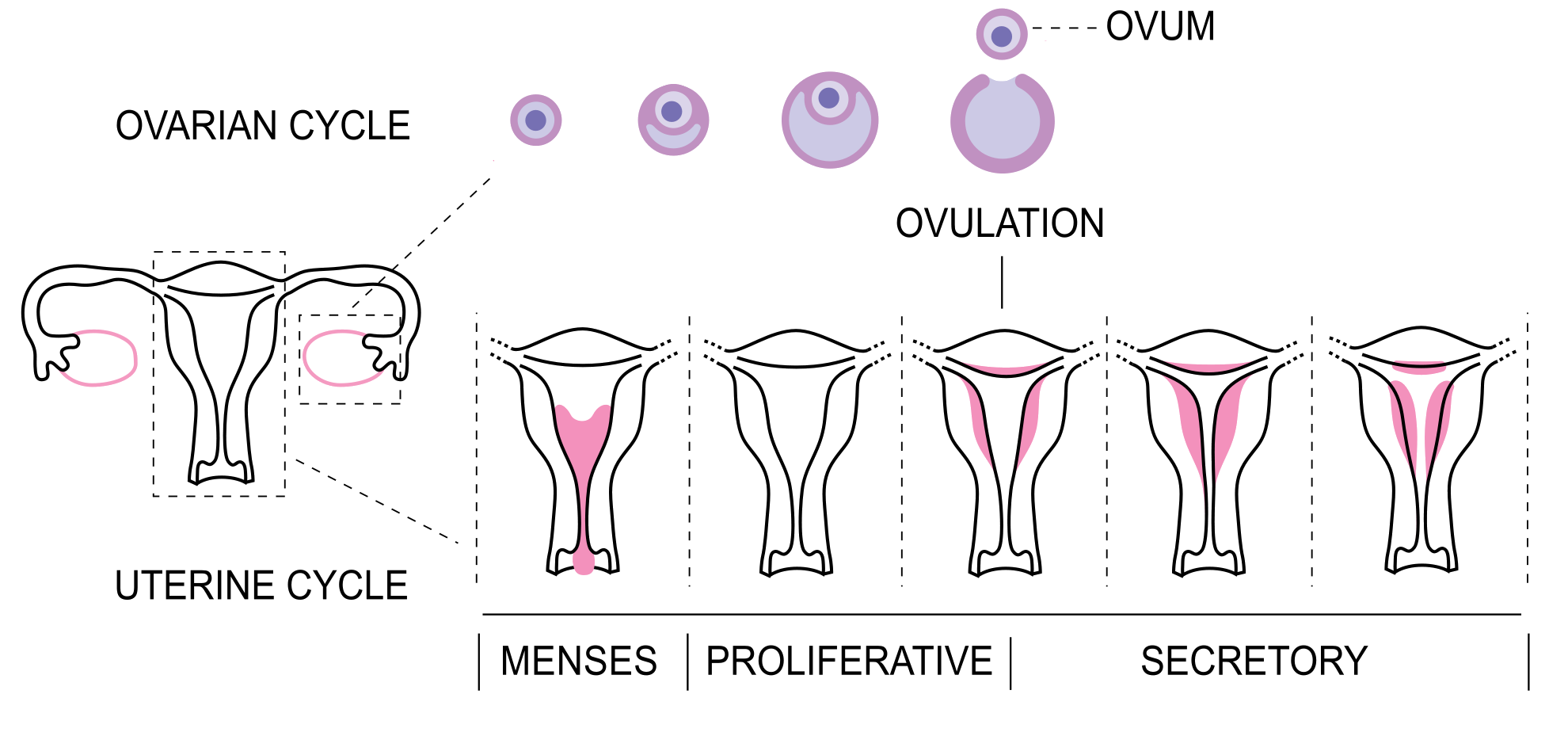Menstruation Cycle the Natural Process – Menstruation, often referred to as a period, is a natural and essential part of a woman’s reproductive health. It is a cyclical process that occurs in females of reproductive age, typically between the ages of 12 to 50. Menstruation is essential for fertility and plays a crucial role in the reproductive system. In this article, we will delve deeper into the intricacies of the menstrual cycle, its phases, hormones involved, menstrual products, menstrual hygiene, common disorders, and its significance in various cultural contexts.
What is Menstruation?
Menstruation is the shedding of the uterine lining, known as the endometrium, that occurs approximately every 28 days in most women. This process signifies the start of a new menstrual cycle. During menstruation, the body eliminates blood and tissues through the vagina. The menstrual cycle is controlled by a delicate interplay of hormones, and any disruption in this balance can lead to irregular periods.
Menstrual Cycle Phases
The menstrual cycle consists of four main phases, each with its unique characteristics:
Menstrual Phase
The menstrual phase marks the beginning of the cycle and involves the shedding of the uterine lining. It typically lasts for 3 to 7 days and is associated with menstrual bleeding.
Follicular Phase
The follicular phase starts after menstruation and lasts for about 7 to 21 days. During this phase, the pituitary gland releases follicle-stimulating hormone (FSH), which stimulates the growth of ovarian follicles. These follicles house the eggs.
Ovulation Phase
The ovulation phase is a crucial period for conception. Around day 14 of the menstrual cycle, a surge in luteinizing hormone (LH) triggers the release of a matured egg from the dominant follicle. This egg travels down the fallopian tube, awaiting fertilization.
Luteal Phase
The luteal phase occurs after ovulation and lasts for approximately 14 days. During this phase, the ruptured follicle transforms into the corpus luteum, which produces progesterone. If fertilization does not occur, the corpus luteum disintegrates, leading to a drop in hormone levels, and the cycle starts anew.
Hormones and Menstruation
Hormones play a pivotal role in regulating the menstrual cycle. The key hormones involved are:
Estrogen
Estrogen is primarily produced by the ovaries and plays a vital role in the development of female sexual characteristics. During the menstrual cycle, estrogen levels rise, leading to the thickening of the uterine lining, preparing it for potential pregnancy.
Progesterone
Progesterone is produced by the corpus luteum during the luteal phase. Its primary function is to support early pregnancy and maintain the uterine lining. When pregnancy does not occur, progesterone levels decrease, triggering menstruation.
Gonadotropin-Releasing Hormone (GnRH)
GnRH is released by the hypothalamus and stimulates the pituitary gland to produce FSH and LH, which, in turn, regulate the menstrual cycle.
Menstrual Products
Several menstrual products are available in the market to manage menstrual flow comfortably:
Menstrual Pads
Menstrual pads, or sanitary napkins, are made of absorbent materials and are worn externally to absorb menstrual blood.
Tampons
Tampons are cylindrical-shaped products inserted into the vagina to absorb menstrual blood before it exits the body.
Menstrual Cups
Menstrual cups are flexible, bell-shaped devices made of silicone or rubber. They are inserted into the vagina to collect menstrual blood and can be reused after proper cleaning.
Menstrual Hygiene
Maintaining good menstrual hygiene is crucial to avoid infections and ensure overall well-being during menstruation. Here are some essential tips for menstrual hygiene:
Importance of Hygiene during Menstruation
Proper hygiene practices during menstruation help prevent bacterial growth and reduce the risk of infections.
Tips for Maintaining Menstrual Hygiene
- Change menstrual products regularly.
- Wash hands before and after changing products.
- Use mild, fragrance-free soap for cleaning.
Common Menstrual Disorders
While menstruation is a natural process, some women experience menstrual disorders that can cause discomfort and disrupt daily life. Some common menstrual disorders include:
Dysmenorrhea (Menstrual Cramps)
Dysmenorrhea is characterized by severe menstrual pain and cramps. It can be managed with pain relievers and heat therapy.
Premenstrual Syndrome (PMS)
PMS involves emotional and physical symptoms that occur before menstruation, such as mood swings, bloating, and breast tenderness.
Amenorrhea
Amenorrhea refers to the absence of menstruation. It can be caused by various factors, including hormonal imbalances, stress, or excessive exercise.
Menorrhagia
Menorrhagia is a condition marked by abnormally heavy or prolonged menstrual bleeding, which may require medical attention.
Menstruation and Exercise
Staying active during menstruation has several benefits, including reducing menstrual pain and improving mood. Engaging in regular exercise can alleviate PMS symptoms and contribute to overall well-being.
Exercise and PMS Symptoms
Regular exercise has been shown to reduce mood swings, anxiety, and depression associated with PMS.
Menstruation and Diet
A healthy diet can positively impact menstrual health. Proper nutrition can help manage hormonal imbalances and reduce menstrual discomfort.
Nutritional Tips for a Healthy Menstrual Cycle
- Consume foods rich in iron, calcium, and magnesium.
- Incorporate fruits and vegetables into your diet.
- Stay hydrated to ease bloating.
Foods to Avoid During Menstruation
- Limit caffeine intake to reduce breast tenderness and irritability.
- Reduce salt consumption to minimize water retention.
Menstruation Stigma and Cultural Perspectives
Unfortunately, menstruation is still stigmatized in various cultures around the world. Breaking the menstrual taboo is essential for fostering awareness and ensuring menstrual equity.
Breaking the Menstrual Taboo
Challenging the societal stigma surrounding menstruation is crucial to promoting open conversations and education.
Menstruation in Different Cultures
Menstruation rituals and practices vary across different cultures, highlighting the diversity of perspectives and beliefs.
Menstrual Cycle and Fertility
Understanding the menstrual cycle is vital for tracking fertility and planning for pregnancy.
Tracking Fertility with Menstrual Cycles
Tracking menstrual cycles can help identify fertile days for those trying to conceive or avoid pregnancy.
Menstrual Irregularities and Fertility
Menstrual irregularities may affect fertility, and seeking medical advice can aid in understanding and addressing potential issues.
Menstruation and Menopause
Menopause marks the end of menstruation and reproductive capabilities in women. The transition to menopause, known as perimenopause, may bring various physical and emotional changes.
Perimenopause and Its Symptoms
Perimenopause is a phase of hormonal fluctuations, leading to symptoms such as hot flashes, mood swings, and irregular periods.
Coping with Menopause
Supportive measures, lifestyle changes, and medical consultations can help ease menopausal symptoms and improve quality of life.
Environmental Impact of Menstrual Products
The environmental impact of traditional menstrual products, such as pads and tampons, has raised concerns about waste generation.
Eco-friendly Menstrual Products
Switching to eco-friendly menstrual products like menstrual cups and reusable pads can significantly reduce environmental impact.
Reducing Menstrual Waste
Proper waste disposal and adopting sustainable menstrual product options are essential steps in reducing menstrual waste.
Menstrual Education and Awareness
Promoting menstrual education in schools and communities is essential for removing the stigma surrounding menstruation.
The Role of NGOs and Government Initiatives
NGOs and government initiatives play a crucial role in advocating for menstrual education and providing access to menstrual products.
Menstrual Empowerment
Menstrual empowerment involves promoting positive attitudes towards menstruation and advocating for menstrual equity.
Breaking Period Stigma
Empowering individuals to openly discuss menstruation can break down barriers and lead to more inclusive societies.
Supporting Menstrual Equity
Menstrual equity involves ensuring access to affordable and safe menstrual products for all individuals.
Conclusion
Menstruation is a natural and fundamental aspect of a woman’s life. Understanding the menstrual cycle, its phases, and the hormonal interplay is essential for maintaining reproductive health and overall well-being. By breaking the stigma surrounding menstruation and promoting menstrual education, we can create a more supportive and inclusive environment for all individuals. Embracing menstrual empowerment and advocating for menstrual equity will pave the way for a healthier and more informed society.
FAQs
- Is it normal for menstrual cycles to be irregular?
- Menstrual irregularities can be common, especially during the early years of menstruation. However, persistent irregularities may indicate an underlying health issue, and it is advisable to consult a healthcare provider.
- Can exercise help reduce menstrual cramps?
- Yes, engaging in regular exercise can help reduce menstrual cramps by promoting blood circulation and releasing endorphins, which act as natural painkillers.
- Are there any natural remedies for managing PMS symptoms?
- Some natural remedies for managing PMS symptoms include consuming foods rich in calcium and magnesium, practicing relaxation techniques, and getting regular exercise.
- Can I get pregnant during my period?
- While the chances of getting pregnant during menstruation are low, it is still possible. Sperm can survive in the body for several days, and if ovulation occurs shortly after menstruation, pregnancy can happen.
- How can I support menstrual equity?
- Supporting menstrual equity can be done by advocating for affordable menstrual products, promoting menstrual education, and challenging menstrual stigma in society.




